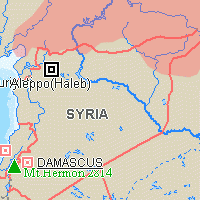![]()
Fri, Aug 19, 2011 | Rubin Reports | By Barry Rubin
Obama Administration Calls for End to Syrian Dictatorship But Reveals Its Own Worldview
After months of rebellion in Syria and heavy repression there, the Obama Administration has finally called for the downfall of that country’s dictatorship.
That is a welcome event though this announcement carries indications that it has taken too long and is not entirely being done for the right reasons. Secretary of State Hillary Clinton began:
“For months, the world has borne witness to the Assad regime’s contempt for its own people. In peaceful demonstrations across the nation, Syrians are demanding their universal human rights. The regime has answered their demands with empty promises and horrific violence, torturing opposition leaders, laying siege to cities, slaughtering thousands of unarmed civilians, including children.”
In other words, the U.S. government has waited a really long time (“for months”) and nobody has done anything (“borne witness”) while the regime has been given every chance by the Obama Administration to offer some meaningless compromises (“empty promises”) in order to preserve an anti-American, terrorist-supporting, aggressive, repressive dictatorship. But it didn’t slaughter enough civilians and children to repress the revolution so now it must go away.
I’m not being cynical here: those are the policy implications of her words.
She continues:
“The Assad government has now been condemned by countries in all parts of the world and can look only to Iran for support for its brutal and unjust crackdown.”
In other words, the U.S. government is only moving on this issue because almost everyone else in the world has already done so. “Leading from behind” indeed.
Yet there’s more and something incredibly significant that nobody will notice. No U.S. national interests are cited for this decision. That is incredible yet everyone will take it for granted. No mention of:
The Syrian regime’s support for terrorism against Americans in Iraq, against Israel, Jordan, and Lebanon; and its reconquest of Lebanon; and its attempts to develop nuclear weapons; and its subversion of Arab-Israeli peacemaking efforts; and its repression before the demonstrations began.
Only humanitarian considerations are mentioned. Now, there’s nothing wrong with humanitarian factors when taken into account as part of a national interests’ policy. Yet consider what the Obama Administration’s kind of thinking means in real terms.
The day before the demonstrations began, and the Syrian regime was killing American soldiers and civilian employees in Iraq, the Obama Administration had no problems with Syria. The Obama Administration wants the dictator gone because he has been inefficient in getting rid of the demonstrators.
After all, if repression had won and thousands were killed and tortured but quiet returned, that would be okay. If President Bashar al-Assad had shut people up with minor reforms that, too, would be okay. And if the regime was killing its own people but most other states accepted that action then that would also be okay.
This is precisely what the Obama Administration is signaling. You can trample U.S. interests and kill Americans but if your people rebel, you can’t repress or buy them off, and everyone else is horrified then the American government will act.
That’s not an exaggeration: that’s the foreign policy philosophy that is dominating U.S. national strategy. Thus, the U.S. government supported revolution in Egypt (without regard to national interests) and Libya (everyone else wanted the dictator, Muammar Qadhafi, gone), but not in Iran (successful repression) or in the Gaza Strip (international acceptance, no revolt).
Clinton then announced new sanctions. These are welcome. But there is no reminder that the Obama Administration undercut whenever possible the sanctions put on by its predecessor, in other words it made a tremendous error in engaging Syria. It was completely wrong in believing that it could pull away Syria from Iran. The critics of this policy were completely right.
No politician trumpets his mistakes but there are veiled phrases that could be used like saying that we gave him every chance to change; we engaged Damascus in good faith but it didn’t respond. The absence of such language indicates the administration has not learned any lesson from the experience.
And then she made another mistake that indicates a flaw in the administration’s foreign policy: “The transition to democracy in Syria has begun, and it’s time for Assad to get out of the way.” This is a nice phrase. But in foreign policy the wish should not be parent of the thought.
We don’t know that a transition to democracy has begun. The resulting regime could be worse. That doesn’t mean the Obama Administration shouldn’t have called for Assad’s overthrow. But it does mean that caution is in order. By not mentioning the negative possibilities at all, the Obama Administration is showing that it either totally disregards them or underestimates them. And how do we know that? Because that is precisely what it did in Egypt and Libya.
What is the biggest danger? An Islamist takeover. And that is precisely, to paraphrase Oscar Wilde, the threat that dare not speak its name. Obama Administration foreign policy is like fighting the Cold War without ever mentioning the word “Communism.”
Finally, Clinton concludes in an eerie reflection of “Progressive” (that is, contemporary leftist) philosophy:
“The people of Syria deserve a government that respects their dignity, protects their rights, and lives up to their aspirations.”
Do people “deserve” a government of a certain kind in a passive sense? It’s as if democratic government is another entitlement program. Democracy can only be attained by struggle, the right worldview, the creation of institutions, the readiness of a society, and many other things.
If Syrians “deserve” such a democracy, didn’t they deserve it last year, a decade ago, four decades ago? And so democracy neither falls from the skies nor is it inevitable. And so while Clinton’s phrase is in one sense purely rhetorical, in another sense it does reflect the administration’s embrace of a mindless naiveté toward Middle East politics that costs very dearly.
Here is an alternative speech for Clinton:
For many years the radical Syrian regime has subverted its neighbors, repressed its people, proven itself to be an enemy of the United States, and blocked the chances for peace in the region, It should have disappeared long ago. Now due to the courage of the Syrian people, there is a real opportunity for change in Syria. We support the efforts of the Syrian people to bring down this dictatorship and we will act to try to ensure they succeed. We call on our allies to cooperate with us. And we will do what we can to assist that country in achieving a stable, democratic government at peace with its neighbors and to defeat extremist forces that seek to establish a new form of dictatorship there.
Or words to that effect. That would show a very different kind of worldview, one that is within the framework of the traditional liberal and conservative spectrum of U.S. foreign policy, and one that might actually succeed.



 RSS
RSS











Obama Administration Calls for End to Syrian Dictatorship But Reveals Its Own Worldview | #Syria #Assad #Obama http://t.co/QGthSSz
Obama Administration Calls for End to Syrian Dictatorship But Reveals Its Own Worldview | #Syria #Assad #Obama http://t.co/QGthSSz